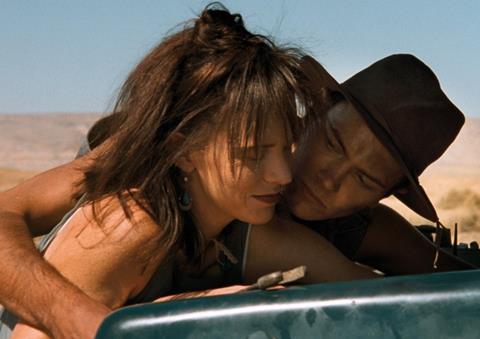Dir: George Sluizer. Netherlands. 2012. 86mins

Dark Blood exhumes a peculiar Western, set on irradiated Indian land, shelved before its release after the death of River Phoenix in 1993. The resurrected drama works best as a time capsule in tribute to the martyred youth. Dark Blood is a politically correct melodrama, and it’s missing some key scenes shot by director George Sluizer with cinematographer Edward Lachman - in its bitterness toward thefts of Indian lands and the contamination of a vast region by atomic tests, it evokes passionate causes of the early 1990’s, with a beatific lead whose short career aroused plenty of passion.
Given the vast sky and stunning landscape, Sluizer directs Dark Blood like a three-hander stage play.
Dated now in its emotional rawness, some of that anger oozes out as unintentional humor - “I’ve got fucking plutonium dust all over me.” Still, the encounter between a Hollywood couple and youthful desert-dweller awaiting the apocalypse adds another chapter to Phoenix lore, and critics may welcome it.
Yet most of those critics and Phoenix fans are over 40, and today’s youth doesn’t know the mythology of an ingenu who overdosed at 23, before they were born. Phoenix hasn’t had a James Dean afterlife, but the film’s restoration story and sheer novelty will fuel demand at festivals. If available in home video formats, Phoenix’s admirers will want to own it.
Neither a buried masterpiece nor a breakthrough performance in the lead, Dark Blood is an unfinished curiosity. Yet it’s the closest thing to a near-adult performance by Phoenix, a missing link boy idol between Johnny Depp and Leonardo DiCaprio.
In Jim Barton’s script, a Bentley belonging to self-absorbed Hollywood actors Harry (Jonathan Pryce) and Buffy (Judy Davis) breaks down in the desert. The couple ignore advice from a disheveled Karen Black and continue on. When the car stalls again, they meet Boy (Phoenix), a callow widower, waiting for the end of the world, whose wife died of cancer caused by radiation from atomic tests. Sluizer fills in the blanks by freezing the frame and reading stage directions and summarising dialogue - more mechanics than a stirring meta-narrative.
Harry is impatient to move on and Buffy is open to Boy’s clumsy and improbable flirtations. In a house that looks like Mad Max’s lair, Harry and Boy argue. After an escape attempt and an interlude between Boy and Buffy, Harry kills Boy’s dog (named Dog). Then Boy, killed by Harry, becomes a martyr – to Hollywood? Then River Phoenix died in an LA hotel.
Given the vast sky and stunning landscape, Sluizer directs Dark Blood like a three-hander stage play. His set is the house, a cabinet of candle-lit curiosities filled with Kachina dolls that Boy carves, plus a sexy photo of Buffy. Cinematographer Edward Lachman gave the cast and cutaway desert shots a vivid look. He couldn’t save the script from the earnest clichés of the time.
Phoenix struggled with his role’s survivalist hard edge, as unlikely for the gentle actor as Boy’s aggressive libido was. His hat and loose clothing seemed an effort to classicise him in the gaunt look of a migrant in John Ford’s The Grapes Of Wrath (1940). Boy’s wild child character blended frontier wisdom and delirium that a mature actor might have balanced. The boyish Phoenix wasn’t ready for that challenge. When his fans see him in close-ups, they won’t mind.
Not even nuclear radiation can explain the cartoonish Hollywood narcissism of Harry and Buffy. These silly roles, better left in the vault for Pryce or Davis, point to someone’s bitterness toward studio culture. Is there part of Dark Blood’s back-story that’s also still missing?
Production companies: Sluizer Films
International sales: Eye Institute, ww.eyefilm.nl
Producer: George Sluizer
Screenwriters: Jim Barton, George Sluizer
Cinematography: Edward Lachman
Editor: Michiel Reichwein
Production designer: Jan Roelfs, Ben van Os
Music: Florencia di Concilio
Main cast: River Phoenix, Judy Davis, Jonathan Pryce, Karen Black







![The Brightest SunScreen[Courtesy HKIFF]](https://d1nslcd7m2225b.cloudfront.net/Pictures/274x183/3/5/0/1448350_thebrightestsunscreencourtesyhkiff_312678.jpg)





















